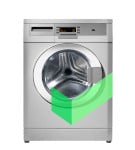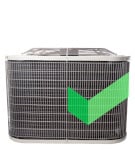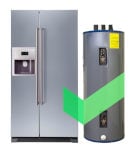
Average NC home age
Average NC home maintenance costs
Average NC home warranty cost
Page Contents
Home warranty coverage in NC | Common home repairs in NC | How to find a HW provider in NC | FAQs
Three Cinch Home Services plans available in North Carolina
Cinch Repair Only

Repair Plus Replace

Best Value
Repair Plus Replace Premier

Cinch
*You can customize and add more items not included in the plans.
TAKE THE UNCERTAINTY OUT OF HOMEOWNERSHIP
Find the perfect home warranty plan that puts you in control of your home.
TAKE THE UNCERTAINTY
OUT OF HOMEOWNERSHIP
Find the perfect home warranty plan that
puts you in control of your home.
Why Cinch Home Services is among the best home warranty companies in North Carolina?
We protect your systems and appliances no matter the age.†
If we can't repair the covered item, we'll replace it.2

We have plans and pricing to fit every budget.

We guarantee our work for 6 months - at no additional cost.
We don't require your inspection or maintenance records.
Our provider network means we'll get the right person to fix your problem.
The diverse climate of North Carolina can place unique demands on your home's systems. Appliances and systems can break down unexpectedly, whether it's high humidity in the summer, occasional flooding from tropical storms or cold snaps in the winter. Homeowners in North Carolina often rely on their HVAC (heating, ventilation and air conditioning) systems to maintain comfort in both summer and winter. A malfunctioning HVAC unit can be a major inconvenience, and having a home warranty to cover the cost of repairs can save you money and stress.
Additionally, North Carolina's humid climate can create problems for plumbing systems, from clogged drains to pipe corrosion. With frequent thunderstorms and occasional flooding in some areas, the risk of water damage is higher, making plumbing issues a concern for homeowners. A comprehensive home warranty can help cover the costs of repairs to these essential systems and other everyday appliances like refrigerators, dishwashers and more.

Did you recently purchase your dream home in a bustling city like Raleigh? Or maybe you’re a longtime resident in a quiet suburb in Greensboro. No matter the case, choosing an experienced home warranty company can help ensure you have access to a network of service technicians who can step up when your appliances and systems break down.
In addition to HVAC systems, home warranties in North Carolina typically cover the household appliances that most people use daily. This includes refrigerators, washing machines and dryers. After all, these appliances take a beating, especially in homes with active families. By selecting a home warranty plan, you can potentially avoid expensive out-of-pocket repair costs and get your appliances back up and running fast.
Home warranty coverage: What your plan should include in North Carolina
When selecting a home warranty in North Carolina, it's crucial to prioritize coverage that protects the systems and appliances most likely to be affected by the state's unique climate and environmental factors. North Carolina's humid climate can accelerate wear and tear on essential systems like HVAC, plumbing and electrical, making them especially prone to issues such as corrosion, leaks, and inefficiencies.
Additionally, residents in coastal areas may face challenges like salt air exposure, which can impact appliances and outdoor systems, while those in the mountains might need plans that address heating system reliability during colder months. A comprehensive warranty plan tailored to these specific needs can help ensure your home remains functional and comfortable year-round, offering valuable financial protection and peace of mind.
How does home warranty work in North Carolina
Choose the best warranty plan for you.

Request service anytime you need it.

We’ll send out the experts to fix the problem.
What to look for in a home warranty company in North Carolina

When shopping the market for a home warranty plan, there are certain things that you should look for. Here’s what you should keep at the top of your list:
- A plan that’s clear, concise and easy to read.
- Workmanship guarantees: Any company that stands by its work is usually reputable.
- A vast network of service technicians is also essential. Finding a warranty company that has many options for service techs in North Carolina will expedite and simplify your repairs.
- Service fees. These are the amounts you'll pay out of pocket when a technician visits your home. Different plans have different fees, so read the fine print before signing.
How to use reviews and testimonials to guide your decision
Whether searching for a home warranty provider in the Raleigh area or a more low key area like Wilmington, online reviews and testimonials can provide helpful insights. Be sure to evaluate the quantity and quality of reviews. A company with only a handful of reviews might not have a solid reputation. Don’t be swayed by a few negative reviews either— look at the overall trend and consider both positive and negative feedback. Multiple sources will give you a clearer picture of the company's reliability.
Frequenly asked questions
Frequently asked questions
or call us: (866) 408-0024
When can you buy a home warranty in North Carolina?
In North Carolina, you can buy a home warranty at any time, regardless of the age of your home or how long you've lived there.
What is a home warranty?
A home warranty is a service agreement between a homeowner and a company that states the terms under which the company will help cover the repair and maintenance costs of home systems and appliances for a given period.
How long does a home warranty last in North Carolina?
A home warranty agreement in North Carolina typically lasts one year.
Which North Carolina home warranty covers the most?
This depends on your specific plan with the home warranty company you select. At Cinch Home Services, our Repair Plus Replace Premier Plan provides comprehensive coverage for most household appliances and systems.
Is there a difference between homeowners insurance and home warranty in North Carolina?
Yes, here’s an easy way to explain the difference between homeowners insurance and a home warranty. Homeowners insurance covers catastrophic, unforeseen events such as accidents, fires and natural disasters. Home warranty protection, on the other hand, covers the appliances and systems in your home that fail due to normal wear and tear. When things such as your HVAC or refrigerator stop working due to normal wear and tear, a home warranty plan is probably worth it and may make it easier (and cheaper) to repair or replace them.
Is a home warranty required in North Carolina?
No, home warranties are not required in North Carolina.
Who pays for the home warranty at closing?
In real estate, a home warranty can be paid for by the buyer or the seller at closing. For the seller, paying for a home warranty can make the property seem more appealing and help reduce repairs while the home is on the market. From the buyer's perspective, having a home warranty can provide peace of mind when moving in – especially if they purchase an older home.
How does a home warranty work for North Carolina real estate sellers?
North Carolina real estate sellers can acquire a home warranty plan for coverage for repairs or replacements of major appliances and home systems when they experience mechanical failure due to normal wear and tear during the listing period. Essentially, the home warranty helps protect the seller from unexpected repair costs if a covered item breaks down while the house is on the market.
What happens with a home warranty lapse?
A home warranty lapse happens if you cancel your agreement or if your agreement isn’t set to auto-renew and you forget to renew it. If this happens, you’ll typically have to wait 30 days before your appliances and systems are covered again. During this lapsed period, you'll be financially responsible for any repairs you may need to your household appliances.
How can you renew your home warranty in North Carolina?
With most home warranty companies in North Carolina, you’ll be notified in advance whether you need to renew, or if you’re already on an automatically renewing plan, you’ll also be notified of any rate and/or coverage changes, no less than 30 days before your current agreement expires.
What customers say about our home warranties:
Cinch Home Services has been pretty prompt in their response. To have a response within 72 hours is pretty amazing. They had to wait for a part but they've taken care of it satisfactorily. They covered their feet, they were very professional and seemed to be knowledgeable.
My washing machine broke down and Cinch ordered the repair to be set up. A part kept being on backorder so they sent me a new washing machine. It was a great experience. They were very good about everything. I also had a claim for the refrigerator and it ended up being a lot more expensive and extensive repair than we originally thought it was going to be. So, that again, was a very good service I’m very happy.
When I call Cinch, they've been all informational, excellent and knowledgeable. Ordered the parts and came right out. So far, they're on time, very easy to contact, schedule and very knowledgeable on what they do. I'm very happy with my experience with Cinch.
Cinch has been very good. They come out right away. Generally, they schedule a service when it's convenient for us, and the technicians we've had have been very nice. Having the home warranty program gives us peace of mind. We got it when we bought a new refrigerator. And in the first year, the compressor went out.
MD
Calvin
Maryland
CT
Cheryl
Connecticut
FL
Frank
Florida
MI
Julie
Michigan
GET AN EXACT HOME
WARRANTY QUOTE FOR YOUR
NORTH CAROLINA HOME
Call our team to get help on finding the right plan for your home
or get answers to any questions you may have.
TALK TO A HOME WARRANTY SPECIALIST
GET AN EXACT HOME WARRANTY QUOTE FOR YOUR NORTH CAROLINA HOME
Call our team to get help on finding the right plan for your home
or get answers to any questions you may have.


